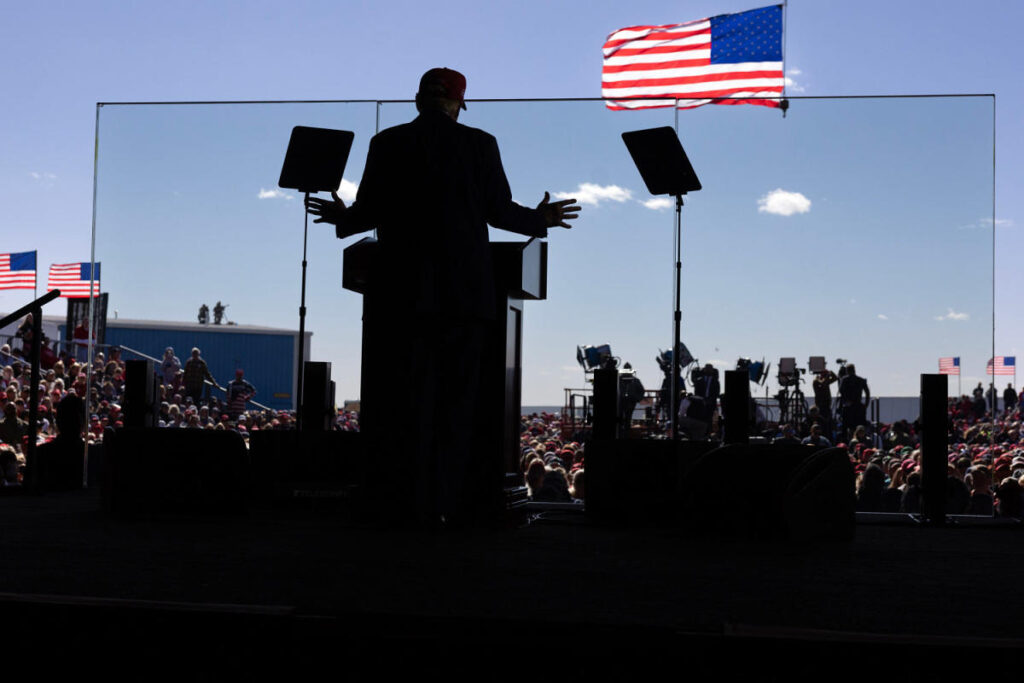In a recent interview on “The Hugh Hewitt Show,” former President Donald Trump expressed strong criticism towards Vice President Kamala Harris regarding her immigration policies at the southern border. He asserted that her approach is fundamentally flawed and suggested a direct connection between certain migrants and criminality, stating, “When you look at the things that she proposes, they’re so far off she has no clue.” Trump referenced a figure of 13,000 individuals, which he claimed are murderers living in the U.S., alleging that these statistics reflect a broader issue of “bad genes” among people crossing the border. His inflammatory remarks reflect a recurring theme in his rhetoric regarding immigration, painting a dire picture of the security implications alleged to stem from lax policies.
Trump’s campaign spokesperson, Karoline Leavitt, clarified that the former president was targeting murderers specifically rather than migrants in general. However, the figure Trump cited has been challenged for its accuracy. According to Immigration and Customs Enforcement (ICE), there are indeed 13,000 immigrants with homicide convictions living outside custody, but two law enforcement officials indicated that this statistic does not account for those detained by state or local authorities. Furthermore, some of these individuals may have entered the United States prior to President Biden’s administration, complicating Trump’s narrative. The broader context shows a decline in border crossings this year, attributed to factors including both the Biden administration’s policies and efforts by Mexico in response to American pressure.
Trump has fueled various narratives blaming Harris for a perceived surge in border crossings and related violence, particularly after Harris was appointed to tackle the root causes of migration from Central America. During a rally, he even called for Harris’s impeachment, alleging her policies have contributed significantly to criminal activity in the U.S. This framing of Harris as responsible for border security failures aligns with Trump’s broader strategy of pointing fingers at political opponents to galvanize his base amid ongoing immigration debates. Historically, Trump and his allies have leveraged immigration issues to question the competency of the Democratic leadership.
The language Trump employs when discussing immigration is consistently derogatory, harkening back to his 2016 campaign where he famously accused Mexico of not sending their best people. His use of phrases such as “poisoning the blood of our country” has evoked sharp criticism, including comparisons to language used by Adolf Hitler, exposing a troubling trend where he invokes fear and suspicion around immigrants. His rhetoric serves not only to frame border security as a national crisis but also aims to tap into deeper anxieties surrounding demographic changes in America.
Trump’s invocation of genetic determinism, suggesting that “bad genes” correlate with criminal behavior among migrants, aligns with past instances where he has toyed with racially charged ideologies, such as when he praised a predominantly white crowd for having “good genes.” This echoes a concept known as “racehorse theory,” which posits that biological inheritance determines individuals’ worth. Such rhetoric reinforces a divisive narrative that seeks to categorize people based on race or origin, drawing sharp lines in a landscape increasingly defined by racial tensions. Critics have condemned these assertions, arguing that they promote fear-mongering and stigmatization rather than constructive dialogue.
Though the immigration debate remains complex, Trump’s comments reflect a persistent pattern of sensationalism and a strategic move to rally support by drawing on populism. His framing casts Harris, and by extension, the Democratic administration, as culpable for national insecurity, using fears surrounding immigration to galvanize his political base. As the nuances of immigration policy continue to evolve, Trump’s rhetoric underscores ongoing societal divisions, shaping public discourse in significant ways. These discussions foster a climate where fear of the ‘other’ often overshadows reasoned policy analysis, complicating efforts toward comprehensive immigration reform.

